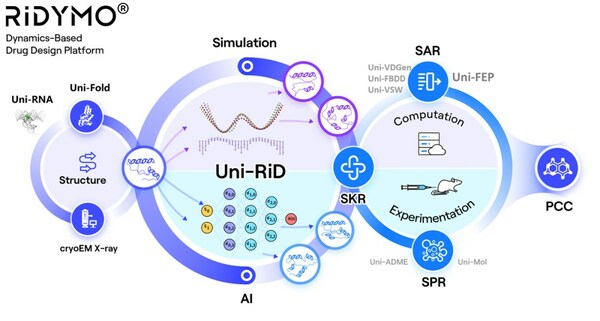- The nomination of novel Kv1.3 inhibitor DPT0218 for the treatment of various immunological diseases including IBD and AD. • DPT0218 is a gut-restricted, highly potent and selective Kv1.3 inhibitor with excellent in vivo efficacy and safety profile in preclinical studies.
- This project further validates the capabilities of DP Technology's drug design platform RiDYMO®.
BEIJING, Jan. 30, 2024 /PRNewswire/ -- DP Technology, an "AI for Science" new paradigm-driven company, today announced the nomination of DPT0218, a novel small molecule targeting Kv1.3, as a preclinical candidate compound for the treatment of various autoimmune diseases, including Inflammatory Bowel Disease (IBD) and Atopic Dermatitis (AD).
The voltage-gated potassium channel Kv1.3 is known to be crucial for maintaining the membrane potential required for the induction of inflammatory responses[1] because Kv1.3 inhibition reduces calcineurin mediated immune cell activation and proliferation[2]. Inhibition of Kv1.3 therefore offers a potential opportunity to specifically impair inflammatory immune cell activity and proliferation, including in antigen-activated T cells. Previously, Eli Lilly and Company (Lilly) made an initial payment of $60 million to D. E. Shaw Research (DESRES), with potential development and commercial milestone payments of up to $475 million for DES-7114, a lead compound of the Kv1.3-targeted therapeutics program.
Recently, the activity of T cells has become a compelling intervention point in IBD[3]. Long-lived memory T-cell populations, particularly tissue resident subsets, may contribute to the chronicity of IBD and represent a potential target for therapy[4]. Kv1.3 expression was elevated in PBMCs from UC patients and correlated with the prevalence of Th1 and Th2 T cells. Kv1.3 expression was also detected on T cells from biopsies of UC patients[5].
It is estimated that there are at least 8 million IBD patients worldwide, of which more than 5 million in Europe and the U.S. The global market for autoimmune drugs is projected to reach $140 billion by 2028, with IBD medications accounting for $28 billion, representing 20% of the market share.
DPT0218 is a potential 'best-in-class' highly selective Kv1.3 inhibitor with a novel scaffold. It has shown positive results in preclinical animal models of various autoimmune diseases such as IBD and AD. The compound exhibits sub-nanomolar potency and has achieved over 2000-fold selectivity for the Kv1.3 channel over a range of other ion channels, including Na+, K+, and Ca2+. It also showed unique DMPK profiles, high colon/ileum concentrations with low systemic exposure in multiple species, demonstrating an excellent safety profile in preclinical studies.
"Although antibodies play a pivotal role in the treatment of moderate to severe IBD, their applications are limited by constrained therapeutic efficacy, immunogenicity, parenteral route of drug delivery, poor tolerability, and high cost." said Xiaomin Zhang, Head of Drug Discovery at DP Technology. "As a small molecule, DPT0218 has shown potent inhibition of T cell activation, proliferation, and cytokine secretion in both in vivo and in vitro studies, demonstrating its potential as an effective treatment for IBD. We'll actively advance DPT0218 to clinical research and explore its application to other autoimmune diseases."
"DP Technology is the pioneer of AI for Science paradigm, dedicated to integrating 'AI + Simulation + Experiments' to address unmet clinical needs." said Weijie Sun, Founder and CEO of DP Technology. "The dynamics of ion channels are extremely complicated, and our RiDYMO® platform is unequivocally well-suited for the drug development of these highly challenging systems. The successful discovery of DPT0218 is an important step towards achieving the AI for Science vision. We look forward to collaborations with seasoned partners to advance this program to the next milestone."
The RiDYMO® drug design platform integrates various AI and physical algorithms, dedicated to the development of drugs for "undruggable" targets and "best-in-class" molecules. As one of its core algorithms, Reinforced Dynamics (RiD) has a significant advantage in the sampling efficiency of molecular dynamics simulation. By fully leveraging the high-dimensional representation capabilities of neural networks, RiD can efficiently capture dynamic conformational changes in complicated biomolecular systems.
The RiDYMO® platform is dedicated to studying the dynamics of biological systems and revealing cryptic binding sites, encompassing a range of challenging systems including protein-protein interactions (PPIs), intrinsically disordered proteins (IDPs), membrane proteins, RNA, and others. It has also been validated on "undruggable" targets including c-Myc and GPX4.
About DP Technology
DP Technology, an "AI for Science" new paradigm-driven company, dedicated to applying Artificial Intelligence and Molecular Simulation algorithms to solve important scientific problems by combining advanced computational methods.Relying on DP Technology's world-leading Dynamics-based drug design platform, RiDYMO®, and the de novo design platform for macromolecules, the team has established external collaborations and built up strong internal pipeline, focusing on three areas of CNS, oncology and autoimmune diseases.
Business:[email protected]
Media:[email protected]
Reference
[1] Chiang EY, Li T, Jeet S, et al. Potassium channels Kv1.3 and KCa3.1 co-operatively and compensatorily regulate antigen-specific memory T cell functions. Nat Commun 2017:14644. |
[2] Lin CS, Boltz RC, Blake JT, et al. Voltage-gated potassium channels regulate calcium-dependent pathways involved in human T lymphocyte activation. J Exp Med 1993:637–45. |
[3] Sandborn WJ, Su C, Sands BE, et al.; OCTAVE Induction 1, OCTAVE Induction 2, and OCTAVE Sustain Investigators. Tofacitinib as induction and maintenance therapy for ulcerative colitis. N Engl J Med 2017:1723–36. |
[4] John T. Chang. Pathophysiology of Inflammatory Bowel Diseases. N Engl J Med 2020:2652-64. |
[5] Anna-Lena Unterweger, Morten Ø. Jensen, Fabrizio Giordanetto, et al. Suppressing Kv1.3 Ion Channel Activity with a Novel Small Molecule Inhibitor Ameliorates Inflammation in a Humanised Mouse Model of Ulcerative Colitis. Journal of Crohn's and Colitis 2021:1943–58. |





